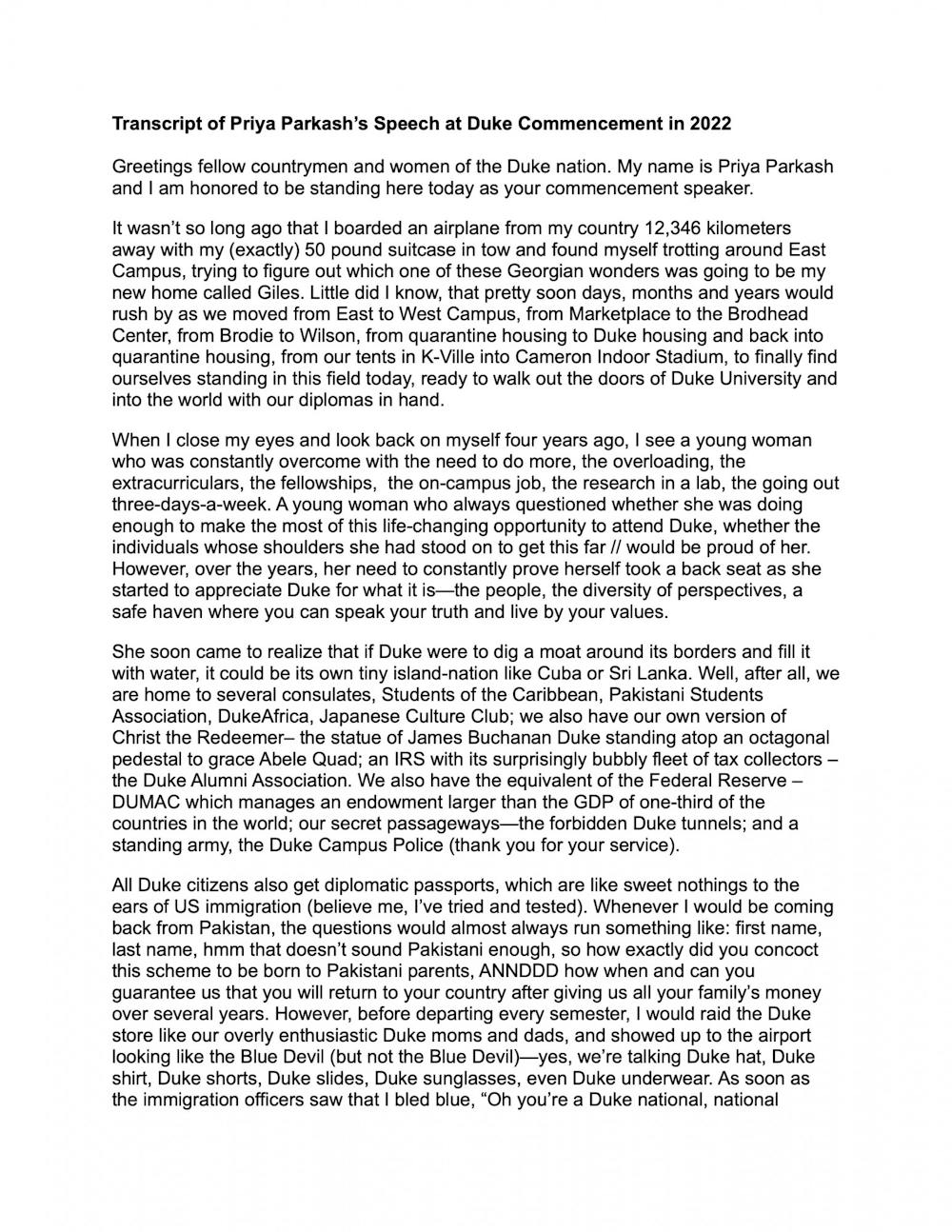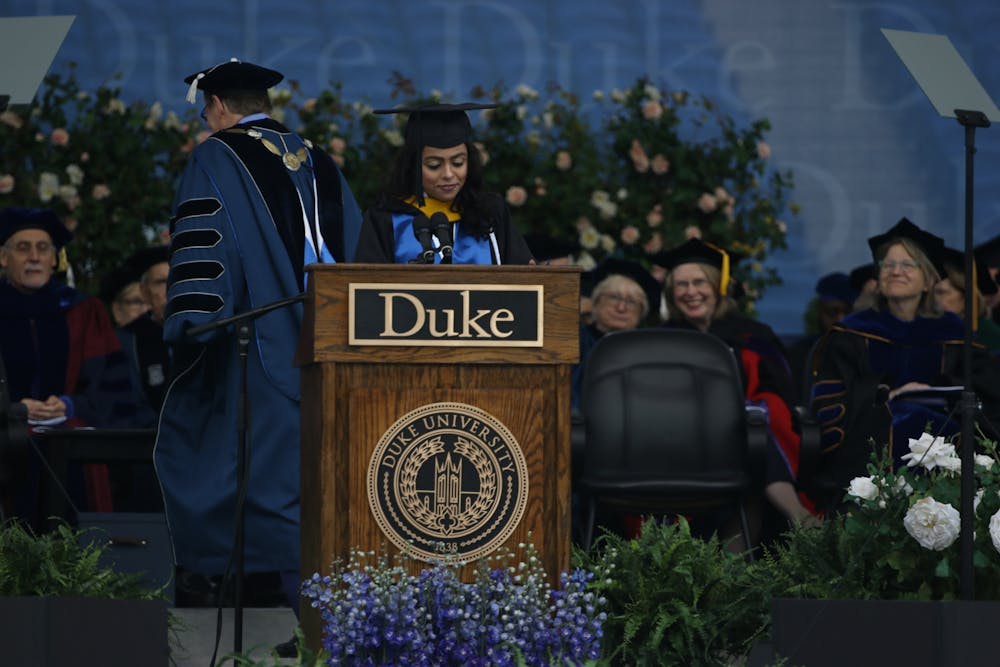When student speaker Priya Parkash took the stage in Wallace Wade Stadium at Sunday’s Class of 2022 Commencement ceremony, she dubbed the University as its own “Duke nation.”
That metaphor, as well as other elements of the language and structure of Parkash’s speech, bears striking similarities to that of a 2014 Harvard University Commencement speech by Sarah Abushaar.
In her speech, Parkash, Trinity ’22, an international student from Pakistan, described her experience of embracing her “Duke citizenship” over the last four years. Parkash, who previously served as a university news editor for The Chronicle and was a 2022 Undergraduate Young Trustee finalist, called on her fellow graduates to use their Duke education to “spur revolutions.”
Abushaar’s speech, titled “The Harvard Spring,” urged the Class of 2014 to bring the spirit of the “Harvard Nation” out into the world to enact change. Her speech was “an homage to the 2010 political uprisings known as the Arab Spring,” according to a release.
Parkash provided a statement to The Chronicle through the crisis public relations firm Red Banyan on Tuesday night.
"When I was asked to give the commencement speech, I was thrilled by such an honor and I sought advice from respected friends and family about topics I might address. I was embarrassed and confused to find out too late that some of the suggested passages were taken from a recent commencement speech at another university. I take full responsibility for this oversight and I regret if this incident has in any way distracted from the accomplishments of the Duke Class of 2022," Parkash wrote.
Michael Schoenfeld, vice president for public affairs and government relations, wrote in an email Monday night that administrators "have just been made aware of this and are looking into it." He declined to comment further, including on the review process of student speech applications.
Schoenfeld provided a statement to The Chronicle on Tuesday morning.
"We are aware of and concerned about these allegations and have initiated a process to understand the facts of the situation," he wrote in a message. "Duke expects all students to abide by their commitment to the Duke Community Standard in everything they do as students."
Harvard and Duke nations

Abushaar, who grew up in Kuwait to a Syrian father and a Palestinian mother, described being struck by the “Harvard Nation” after arriving to campus. She compared the John Harvard statue to the Statue of Liberty; the Harvard Clubs of Boston and London to embassies; and the Harvard Alumni Association to a tax collection agency.
Parkash’s speech similarly describes Duke as its “own tiny island-nation like Cuba or Sri Lanka,” with its distinct collection of landmarks and agencies.
She compared the statue of James B. Duke in Abele Quad to that of Christ the Redeemer in Brazil; the Duke Alumni Association to the Internal Revenue Service, a tax collection agency; and DUMAC to the Federal Reserve.
Harvard and Duke’s ‘diplomatic passports’

Both Abushaar and Parkash told stories of how their identities as “a citizen of Harvard” and a “Duke national,” respectively, allowed them to pass through U.S. Customs and Border Protection at airports unquestioned.
Using identical phrases, both speeches expressed that with symbolic “diplomatic passports,” Abushaar and Parkash were no longer considered a “national security threat” when donning their university’s merchandise.
When U.S. immigration at Boston Logan International Airport saw Abushaar coming from the Middle East, she recalled that they would ask, “What were you doing there? Why are you here? Why did God make you from the Middle East?”
Thus, Abushaar made sure to dress in “Harvard hat, Harvard shirt, Harvard shorts, and Harvard underwear.” When immigration officers saw that she “was a citizen of Harvard,” they disregarded her as a “national security threat,” she said.
“And suddenly all the gates to the American Dream opened wide,” Abushaar said. “I saw it everywhere, this ‘Harvard Nation.’”
Parkash similarly said she heard questions from immigration officers when arriving in the U.S.: “First name? Last name? That doesn’t sound Pakistani enough, so how exactly did you concoct the scheme to be born to Pakistani parents?”
But at the end of each semester, Parkash would arrive at the airport in “Duke hat, Duke shirt, Duke shorts, Duke slides, Duke sunglasses … even Duke underwear.” When customs officials saw that Parkash “bled blue” as a “Duke national,” they no longer considered her a “national security threat,” she said.
“And all of a sudden … the doors to this whole new world of possibilities flung wide open,” Parkash said.
Further similarities

Other similarities between the content and language of the two speeches can be found in the descriptions of the universities’ student activities.
Abushaar described seeing this “Harvard Nation” beyond tangible structures, but rather in the “invisible institutions” and the “invisible scaffolds around and undergirding the hard institutions.”
Likewise, Parkash said she experienced this “Duke citizenship” even more as the “overtly visible, the concrete institutions” were overtaken by an understanding of the “unseen wiring that holds our school together.”
Abushaar cited the announcements tacked onto Harvard’s bulletin boards as evidence of student “passions, purpose, creativity … a heartbeat of civic community’s vivacity.”
Parkash discussed emails about student group events, social justice petitions and student debates as “proof of our puffing, panting and gasping civic communities.” She added that they were “a testament to the beating heart of Duke citizens, overflowing with ingenuity, fervor, resolve and purpose.”
Both speakers mentioned the “potency” of the schools’ student newspapers’ opinion articles to create change.

Later in her speech, Abushaar quoted the Arab-American author Randa Jarrar’s description of living in a new place: “...running barefoot, the skin of our feet collecting sand and seeds and rocks and grass until we had shoes, shoes made of everything we’d picked up as we ran.”
Abushaar related the quote to her and her fellow graduates’ four years of “running through Harvard Yard” where the “skin of [their] feet [collected] a world of experiences.”
She described each student as having “become this place in a strange way, each of us picking up bits of people and history and ideas that changed the way we saw the world.”
Similarly, Parkash concluded her speech by pointing out to her fellow graduates that “the soles of [their] shoes have collected a world of experiences.”
Like Abushaar, she noted that members of the Class of 2022 have all “become this place in rather perplexing ways, each one of us internalizing pieces of people and history and ideas that have transformed our outlook on the world.”
Transcripts of both Abushaar and Parkash’s speeches are embedded at the bottom of this article. Abushaar’s full speech was checked against the original recording of her speech; Parkash’s was uploaded to Duke Today on Sunday.
Editor's Note: This story has been updated Tuesday morning to include a statement from Michael Schoenfeld, vice president for public affairs and government relations. This story was updated again on Tuesday night to include a statement from Parkash.




Get The Chronicle straight to your inbox
Signup for our weekly newsletter. Cancel at any time.

Milla Surjadi is a Trinity junior and a diversity, equity and inclusion coordinator of The Chronicle's 119th volume. She was previously editor-in-chief for Volume 118.

